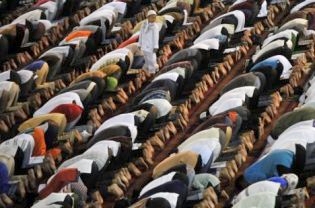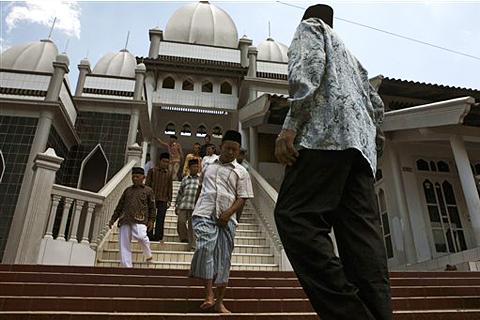OPINIONMon, 10/03/2011 7:57 PM
The dying canary and Indonesia’s religious freedom
Tobias Basuki, Jakarta
“Religious liberty is the proverbial canary in the mine,” according to Doug Bandouw, a senior fellow at the Cato Institute. Canaries are often used by miners as an early-warning signal for poisonous gases. When the small birds stop singing and suffocate, miners know toxic gases have polluted the area and something is wrong.
The right of religious freedom for small groups within a country is a vital indicator of the health of society. Religious freedom is the most basic freedom. Without it, it is doubtful that the lives and dignity of its citizens is truly respected.
Religious minorities in Indonesia have recently been systematically and aggressively silenced. Repression is allegedly perpetrated by religious extremists. The state is not without blame either.
The state partakes in the oppression of its own citizens, first through oversight and omission, and second by undertaking discriminatory actions and policies. The Blasphemy Law and a joint ministerial regulation on the Ahmadiyah minority Islamic sect are proof.
Two cases illustrate the dire condition of religious freedom in Indonesia.
First is the plight of the Ahmadis. The Ahmadis were part of our archipelago’s society even before independence and partook in the independence movement. The sect has now been cast aside and discriminated against.
Physical and verbal attacks against them have intensified in the past five years. One attack culminated in the slaughter of three members in Cikeusik, Banten.
Adding greater madness to the brutality was the gross injustice of our judiciary.
Those who participated in the vicious attacks were sentenced to jail for terms as little as three to six months. Deden Sudjana, whose house the Ahmadis were protecting, received a harsher sentence than those convicted of instigating the violence, who were hailed as heroes upon their release.
The Ahmadis understandably decided not to pursue and prolong the case considering the amount of prejudice and unfair treatment they have had to endure.
It was the first sign that the canary was not doing well.
The Blasphemy Law and the logic used to apply it is schizophrenic. Here is an example: The Blasphemy Law prohibits the existence of religions that resemble a major religion and also prohibits programming based on such religions from being broadcast.
In one city, an Ahmadiyah mosque was attacked and closed because it had a sign identifying it as an Ahmadiyah place of worship. The sign was considered “broadcasting” under the law. In another city, an Ahmadiyah mosque was attacked and closed because it had no signs on it and was accused of luring Muslims inside for conversion.
There are some well-intentioned arguments that state the Ahmadis should declare a new religion to avoid further prosecution. But the same logic would immediately put them in the crosshairs again.
The sect’s similarity to Islam puts it at odds with the law and prejudice against them. Labeling is not the issue; it is the bigoted view and actions of the few that are the main problems.
Another poignant example is the case of GKI Taman Yasmin. The congregation obtained a permit to build a church in July 2006. The construction, however, was stopped in 2008 by the head of Bogor’s Urban Planning and Landscaping Agency.
The church challenged the decision in court, which annulled the suspension issued by the city.
The annulment was disregarded and the church took its plight to the Supreme Court, which also ruled in favor of the church. Obstinately, the Bogor government under Mayor Diani Budiarto has chosen to blatantly disobey the Supreme Court’s ruling.
Opposition to the church’s construction is based on feeble grounds and outright ridiculous statements involving alleged counterfeit signatures, obstructing businesses and the infamous “no church should be on a street named after a Muslim”.
The reasoning proposed by the officials begs a serious question about the real motives behind the church ban. I attended one of the outdoor services conducted by the congregation in front of the sealed church.
None of the “public inconvenience” accusations held true. Even with a large number of visitors and an outdoor service, traffic was barely disturbed. There were no visible or plausible disturbances to businesses or the community.
However, one thing is clear. The mayor has broken the law on several accounts. First, he ignored court rulings, including a ruling from the Supreme Court. Second, the city violated the Regional Autonomy Law, which states that religion is the jurisdiction of the central government, not the local government.
Last but most flagrantly, Diani violated the Constitution and his oath of office. His repeated disregard of a court decision has made him a law breaker. The mayor should be impeached at the very least.
The canary is not dead … yet.
Indonesia as a nation faces two towers of evil. The first is epidemic corruption. It is like anemia. It is fatal, widespread and will kill us slowly. The second is radicalism and narrow-minded bigotry. Many say the radicals are few. It is true, but these few let loose will wound the nation and bleed us.
It is like a flesh wounds. It may not necessarily be fatal, but with a cancer draining our blood, a small wound can worsen and break us apart.
The writer is a graduate of Northern Illinois University and a lecturer at Pelita Harapan University, Tangerang.
The right of religious freedom for small groups within a country is a vital indicator of the health of society. Religious freedom is the most basic freedom. Without it, it is doubtful that the lives and dignity of its citizens is truly respected.
Religious minorities in Indonesia have recently been systematically and aggressively silenced. Repression is allegedly perpetrated by religious extremists. The state is not without blame either.
The state partakes in the oppression of its own citizens, first through oversight and omission, and second by undertaking discriminatory actions and policies. The Blasphemy Law and a joint ministerial regulation on the Ahmadiyah minority Islamic sect are proof.
Two cases illustrate the dire condition of religious freedom in Indonesia.
First is the plight of the Ahmadis. The Ahmadis were part of our archipelago’s society even before independence and partook in the independence movement. The sect has now been cast aside and discriminated against.
Physical and verbal attacks against them have intensified in the past five years. One attack culminated in the slaughter of three members in Cikeusik, Banten.
Adding greater madness to the brutality was the gross injustice of our judiciary.
Those who participated in the vicious attacks were sentenced to jail for terms as little as three to six months. Deden Sudjana, whose house the Ahmadis were protecting, received a harsher sentence than those convicted of instigating the violence, who were hailed as heroes upon their release.
The Ahmadis understandably decided not to pursue and prolong the case considering the amount of prejudice and unfair treatment they have had to endure.
It was the first sign that the canary was not doing well.
The Blasphemy Law and the logic used to apply it is schizophrenic. Here is an example: The Blasphemy Law prohibits the existence of religions that resemble a major religion and also prohibits programming based on such religions from being broadcast.
In one city, an Ahmadiyah mosque was attacked and closed because it had a sign identifying it as an Ahmadiyah place of worship. The sign was considered “broadcasting” under the law. In another city, an Ahmadiyah mosque was attacked and closed because it had no signs on it and was accused of luring Muslims inside for conversion.
There are some well-intentioned arguments that state the Ahmadis should declare a new religion to avoid further prosecution. But the same logic would immediately put them in the crosshairs again.
The sect’s similarity to Islam puts it at odds with the law and prejudice against them. Labeling is not the issue; it is the bigoted view and actions of the few that are the main problems.
Another poignant example is the case of GKI Taman Yasmin. The congregation obtained a permit to build a church in July 2006. The construction, however, was stopped in 2008 by the head of Bogor’s Urban Planning and Landscaping Agency.
The church challenged the decision in court, which annulled the suspension issued by the city.
The annulment was disregarded and the church took its plight to the Supreme Court, which also ruled in favor of the church. Obstinately, the Bogor government under Mayor Diani Budiarto has chosen to blatantly disobey the Supreme Court’s ruling.
Opposition to the church’s construction is based on feeble grounds and outright ridiculous statements involving alleged counterfeit signatures, obstructing businesses and the infamous “no church should be on a street named after a Muslim”.
The reasoning proposed by the officials begs a serious question about the real motives behind the church ban. I attended one of the outdoor services conducted by the congregation in front of the sealed church.
None of the “public inconvenience” accusations held true. Even with a large number of visitors and an outdoor service, traffic was barely disturbed. There were no visible or plausible disturbances to businesses or the community.
However, one thing is clear. The mayor has broken the law on several accounts. First, he ignored court rulings, including a ruling from the Supreme Court. Second, the city violated the Regional Autonomy Law, which states that religion is the jurisdiction of the central government, not the local government.
Last but most flagrantly, Diani violated the Constitution and his oath of office. His repeated disregard of a court decision has made him a law breaker. The mayor should be impeached at the very least.
The canary is not dead … yet.
Indonesia as a nation faces two towers of evil. The first is epidemic corruption. It is like anemia. It is fatal, widespread and will kill us slowly. The second is radicalism and narrow-minded bigotry. Many say the radicals are few. It is true, but these few let loose will wound the nation and bleed us.
It is like a flesh wounds. It may not necessarily be fatal, but with a cancer draining our blood, a small wound can worsen and break us apart.
The writer is a graduate of Northern Illinois University and a lecturer at Pelita Harapan University, Tangerang.
Copyright © 2008 The Jakarta Post - PT Bina Media Tenggara. All Rights Reserved
URL: www.thejakartapost.com/news/2011/10/03/the-dying...freedom.html
URL: www.thejakartapost.com/news/2011/10/03/the-dying...freedom.html




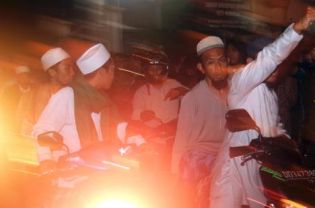
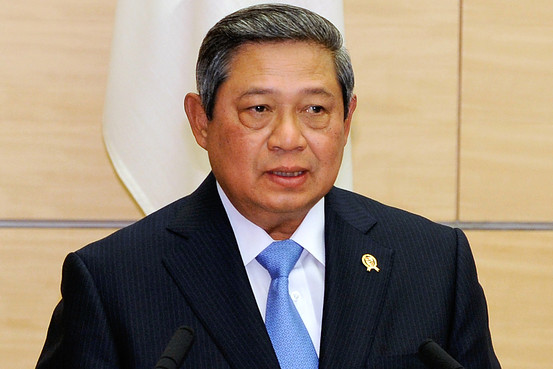
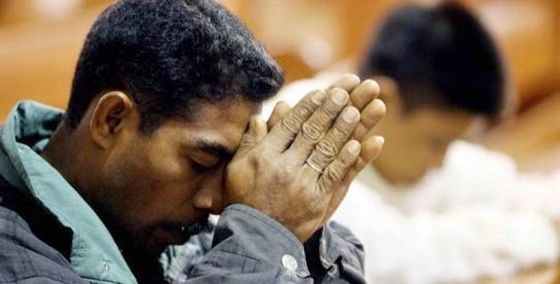


 One is amazed at the audacity of the advocates of blasphemy laws, who think of themselves as vigilant guards of not only the Almighty, but religious personages as well, thereby creating an illusion that God and the Prophet (PBUH) might not be able to deal with the blasphemer
One is amazed at the audacity of the advocates of blasphemy laws, who think of themselves as vigilant guards of not only the Almighty, but religious personages as well, thereby creating an illusion that God and the Prophet (PBUH) might not be able to deal with the blasphemer Nothing will cripple the terrorists more decisively than a tolerant, moderate and democratic Pakistan that respects human rights and treats all its citizens equally. No victory would be permanent if such a Pakistan is not achieved
Nothing will cripple the terrorists more decisively than a tolerant, moderate and democratic Pakistan that respects human rights and treats all its citizens equally. No victory would be permanent if such a Pakistan is not achieved

